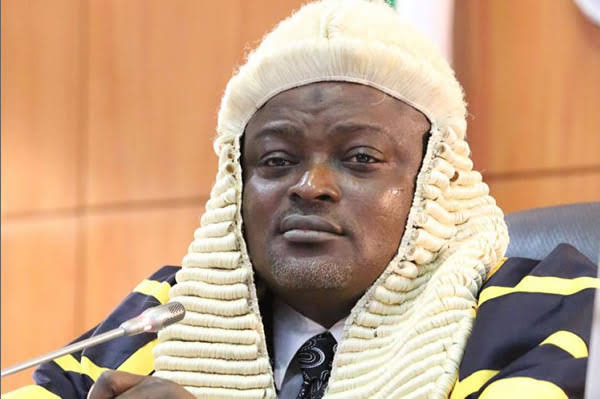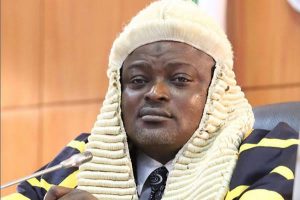News
PUBLIC HEARING: LAGOS ASSEMBLY OBTAINS STAKEHOLDERS OPINION ON DNA, FORENSIC CENTER BILL

PUBLIC HEARING: LAGOS ASSEMBLY OBTAINS STAKEHOLDERS OPINION ON DNA, FORENSIC CENTER BILL

Obasa
AJAGBE ADEYEMI TESLIM SPONSORED BY: H&H
Lagos Assembly on Wednesday organised a-day public hearing on “A Bill for a Law to provide for the establishment of the Lagos State Deoxyribo-Nucleic Acid (DNA) and Forensic Center, to support criminal investigation, Law enforcement and the preservation of evidences for the judicial system and for other connected purposes” to obtain stakeholders and the Publics opinion on the Bill.
In his Welcome Address, the Chairman Joint Committee on Judiciary, Human Rights, Public Petitions and LASIEC and Health Services, Hon. Victor Akande stated that the Bill is a corroboration of the House’s responsiveness and responsible to any matter affecting the citizenry especially as it relates to criminal investigation and dispensation of justice in Lagos State.
He further urged for vibrant contributions in order for a judicious and practicable legislation for the benefit of Lagosians.
Giving his Keynote Address, Deputy Speaker, Hon. Wasi Eshinlokun-Sanni, representing the Speaker Rt. Hon. (Dr.) Mudashiru Obasa stated that the bill seeks to enable the forensic center in providing a suitable data bank that will encompass information of Lagos residents to better solve and prevent criminal activities in the State.
“If we want our desired developments to become reality, we need accurate robust information with these population and immigration realities. There is the need for a suitable databank that will have an across the board information of Lagos residents”.
Hon. Sanai Agunbiade, giving the extensive Overview of the Bill assured the Stakeholders that the bill had enjoyed robust debate on the floor of the House and having survived on merit is being committed to the joint Committee on judiciary and Health Services for more input by stakeholders and the publics.
Enjoining the Stakeholders that, “As professionals, we want you to assist us to give Lagosians a clear, unambiguous Law that will be beneficial to all and other States to use as specimen for their own Law”. He Said.
In his analysis, Mr. Moyosore Onigbanjo SAN, Lagos State Attorney General /Commissioner for Justice adjudged that the bill is another display of the dynamism that Lagos Assembly is working in collaboration with the other arms of government.
Adding that the Bill serves as a tool in the creation of the Forensic and DNA center and it will assist Lagosians in sleeping easier. “Science has progressed so much that we cannot go back to analog method therefore we must deploy the use of forensic services to fight crimes.
Prof. Akin Abayomi, Commissioner for Health while following the line of the Commissioner for Justice, spine in the pioneering spirit of Lagos by using Law as an opportunity to make the State a safer place as the commissioning of crime can be adjudicated and criminals can be brought to book.
“The power of bio-technology allows for the placement of old crimes and to shed more light on previous circumstances leading to the crime. It is a step in the right direction to utilise the science of bio-technology which is an exact and advance science of cataloguing circumstantial materials and data associated with matter under investigation”.
Following the contributions of the Stakeholders, Dr. Salawu Tajudeen, Vice Chairman, Nigerian Medical Association while commending the House noted that Forensic is multifaceted and the functionality of the center must reside with the professionals of the medical sector.
Deputy Chief Registrar of the High Court, Mr. Fadeyi on the part of the judiciary highlighted that there should be a definition which should include the High Court and Magistrate as they are the principal coroners of the judiciary system.
He added that the establishment of the Center will assist in extraditing and resolving issues such as ballistic and forensic test challenges.
In his contribution, Dr. Babafemi Thomas, Director Pathology Services advocated that many sub-division branches of forensic science should be captured in the bill as well as the body that will be responsible for the funding as it will guide and reduce instruments of conflict.
Dr. Jibola Keshiro, Managing Director, Apapa General Hospital is of the opinion that the role of the Director of the Center goes beyond legal services as it is more technical and involves medical professionalism, therefore a medical professional and specialist be recommended for the position.
In response to the concerns raised on some clauses in the Bill, the Deputy Speaker, Hon. Wasi Eshinlokun-Sanni assured the stakeholders and the publics that the Bill will include their aggregate.
